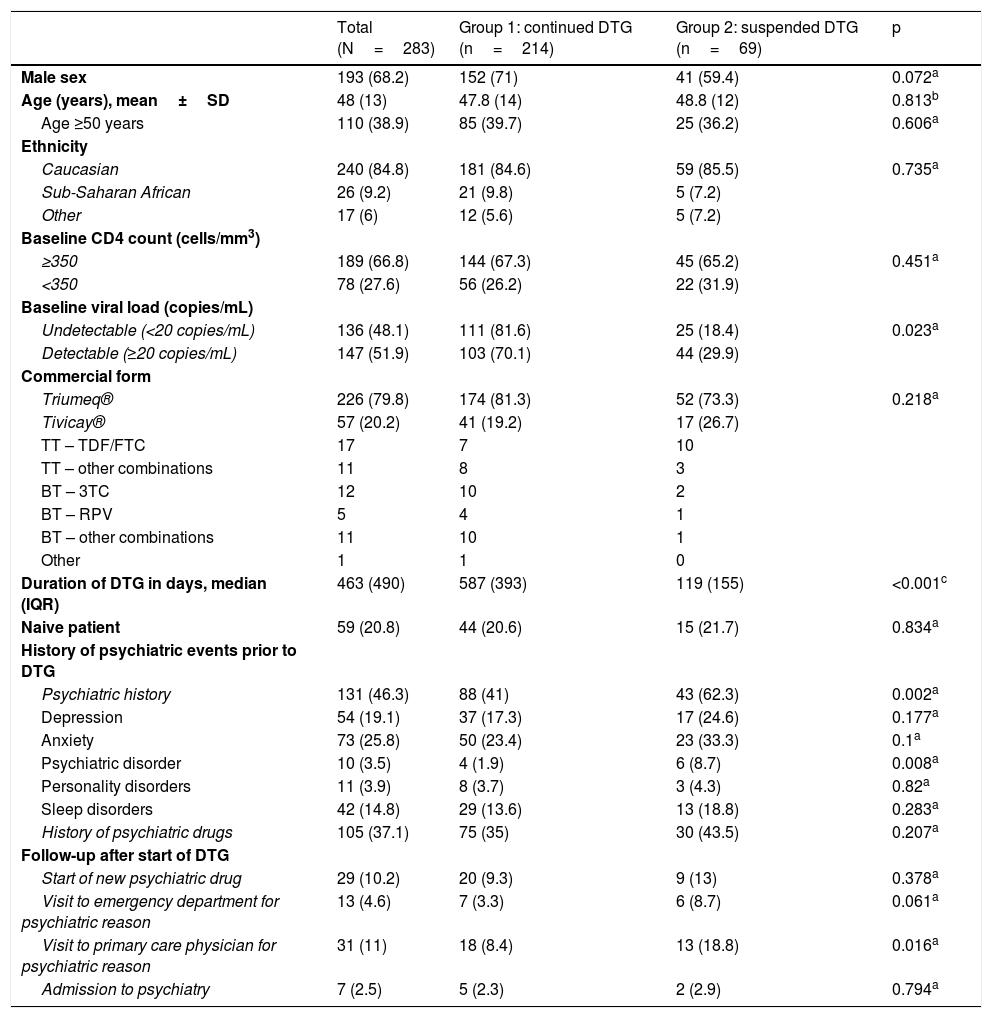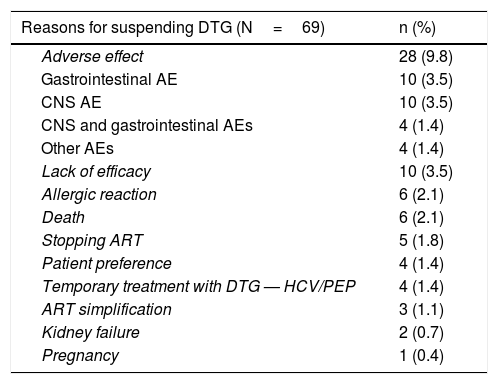Integrase inhibitors (INI) and especially dolutegravir (DTG) are placed as a first-line antiretroviral treatment for their efficacy and safety. Although in the pivotal trials the rate of adverse effects (AEs) was low (2–3%), in real-life studies it appears to be higher, especially neuropsychiatric AEs. The objective is to determine the percentage of AEs and discontinuation of DTG in our site and the relationship with the psychiatric background.
MethodsRetrospective descriptive study of patients starting DTG from 2015 to 2017. Discontinuation of treatment, adverse effects and previous psychiatric pathology were recorded. Follow-up is carried out since the beginning of the treatment and hospitalizations, emergency room (ER) visits and primary care (PC) were registered. The study was authorizedby the Ethics Committee for Clinical Research of Aragon.
Results283 patients were included, between 11 and 87 years old, 70% male. 21% were naive. 24% of the patients discontinued treatment with DTG, 10% due to AEs. Neuropsychiatric AEs were was detected in 5%. This group of patients had a more frequent previous psychiatric history (62 vs 41%; p=0.002) than the ongoing treatment group and they needed more visits to PC (18.8 vs 8.4% p=0.016), ER (8,7 vs 3.3% p=0.061) and in one case even hospitalization due to AE.
ConclusionPatients who discontinued treatment with DTG had more psychiatric history. Although more studies are required, it is necessary to assess this background before starting treatment with INI. Symptoms such as anxiety, insomnia, depression can be DTG AEs more frequently than expected. Being identified by PC and emergency physicians could avoid the unnecessary prescription of other medications.
Los inhibidores de integrasa (INI) y especialmente dolutegravir (DTG) son el tratamiento de primera línea antirretroviral por su eficacia y seguridad. Aunque en los ensayos pivotales la tasa de efectos adversos (EA) era baja (2–3%), en los estudios de vida real parece ser mayor, especialmente los EA neuropsiquiátricos. El objetivo fue determinar el porcentaje de EA y discontinuación de DTG en nuestro centro y la relación con los antecedentes psiquiátricos.
MétodosEstudio descriptivo retrospectivo de pacientes que iniciaron DTG entre 2015−2017. Se registraron: discontinuación, efectos adversos y patología psiquiátrica. Se realizó seguimiento desde inicio del fármaco y se registraron las hospitalizaciones, visitas a urgencias y atención primaria (AP). Fue autorizado por el Comité Ético de Investigación Clínica de Aragón.
ResultadosSe incluyeron 283 pacientes, entre 11–87 años, 70% varones. El 21% naive. Discontinuó tratamiento con DTG el 24%, 10% por EA. Se detectó un 5% de EA neuropsiquiátricos. Este grupo tenía más antecedentes psiquiátricos (62 vs 41%; p=0,002) que el de pacientes que continuaron el tratamiento, y precisaron más visitas en AP (18,8 vs 8,4% p=0,016), urgencias (8,7 vs 3,3% p=0,061).
ConclusiónLos pacientes que discontinuaron tratamiento con DTG tenían más antecedentes psiquiátricos. Por lo que, aunque se precisan más estudios, sería necesario valorar este antecedente previamente al tratamiento con INI. Síntomas como ansiedad, insomnio, depresión pueden ser EA de DTG en una frecuencia mayor a la esperada. Ser identificados por los médicos de AP y urgencias podría evitar una cascada de prescripción innecesaria.
Article
Socio de la Sociedad Española de Enfermedades Infecciosas y Microbiología Clínica

Para acceder a la revista
Es necesario que lo haga desde la zona privada de la web de la SEIMC, clique aquí
Para realizar los cursos formativos
La actividad estará abierta para socios de la SEIMC. IMPORTANTE, recuerde que requiere registro previo gratuito. Empezar aquí









